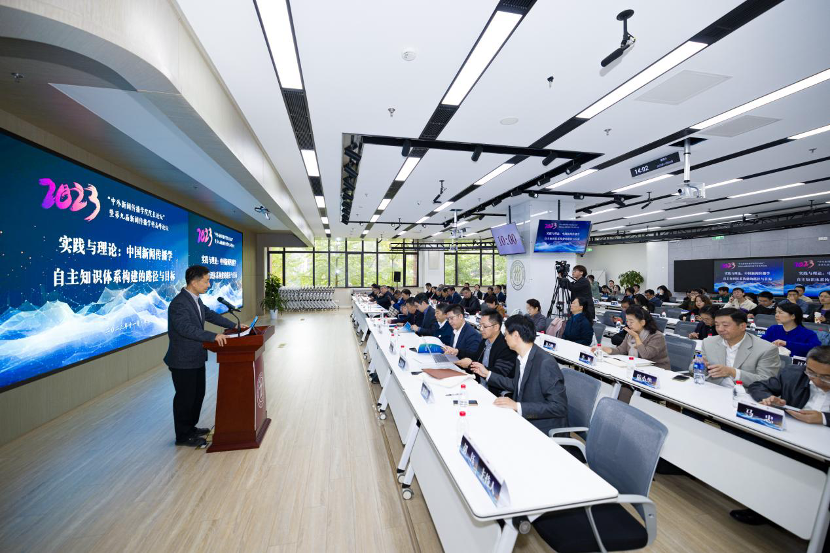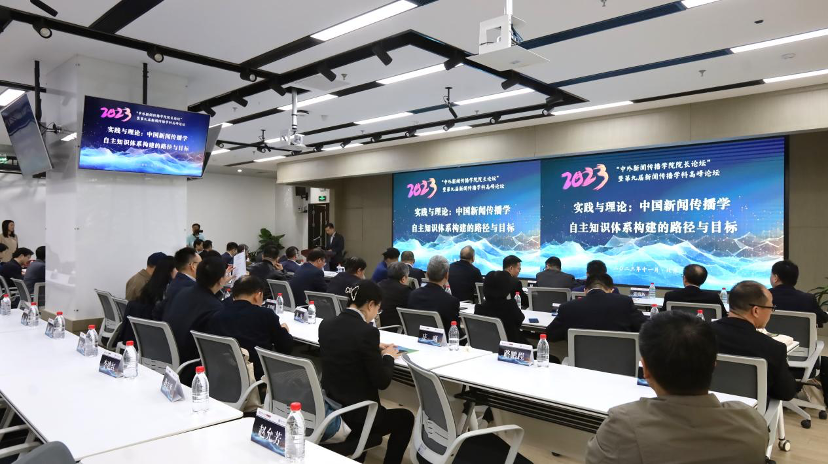2023 “International Journalism and Communication Deans’ Conference” and the 9th Journalism and Communication Discipline Summit Forum Held
To actively implement the important guiding spirit of General Secretary Xi Jinping on constructing autonomous knowledge system with Chinese characteristics, comprehensively answer the questions of China, the world, the people, and the times, and promote the in-depth development of journalism and communication research, education, and practice in China, on the afternoon of November 4, the 2023 “International Journalism and Communication Deans’ Conference” and the 9th Journalism and Communication Discipline Summit Forum jointly organized by the School of Journalism of Renmin University of China, the School of Journalism and Communication of Tsinghua University, and the Journalism and Communication Specialty Committee of China Association of Higher Education, was held at Renmin University of China.

The forum, centered around the theme “Practice and Theory: Pathways and Goals for Constructing an Autonomous Knowledge System of Journalism and Communication with Chinese Characteristics,” featured a main forum and multiple parallel sub-forums. It invited deans of journalism and communication schools and editors-in-chief of academic journals from both domestic and international institutions to engage in academic exchanges and theoretical dialogues. The discussions focused on exploring cultural exchange and civilization co-building through communication, helping the Chinese story and the Chinese voice better reach the world.
The keynote speeches at the main forum were hosted by Hu Yu, Party Secretary of the School of Journalism and Communication at Tsinghua University.
Sui Yan, Dean of the School of Journalism of Communication University of China, elaborated on the rationality and mission behind building an autonomous knowledge system in communication. He emphasized that the system should address two “others”: our relationship with the world and our relationship with other disciplines. He also pointed out that educators in the field of journalism and communication should respect both the laws of education and the discipline itself, ensuring that the use of technology supports, rather than detracts from, the field.
Zhang Taofu, Dean of the School of Journalism of Fudan University, presented his thoughts on the shift from “being dependent” to “independent.” He analyzed the weaknesses in the disciplinary knowledge system and the production of Chinese journalism and communication knowledge, and suggested a framework for constructing an autonomous knowledge system with Chinese characteristics based on three aspects: knowledge, values, and rules. From the knowledge perspective, it is essential to distill experiential knowledge to achieve the purpose of truth-seeking; from the values perspective, it emphasizes the interpretation of meaning; and from the rules perspective, it focuses on norms and paradigms, stressing the importance of returning to China's reality and the fundamental issues in constructing the system.
Qiang Yuexin, Dean of the School of Journalism and Communication of Wuhan University, discussed talent cultivation in journalism and communication. He raised three questions: Should the discipline be labeled as experimental or practical teaching? Which is more important—hardware or software construction? Should experimental teaching focus on regulation or innovation? He emphasized the importance of software development in practical teaching and the need to blend innovation with standardization.
Chen Gang, Dean of the School of Journalism and Communication at Peking University, explained the inevitability of constructing an autonomous knowledge system from a global perspective, emphasizing that such a development requires continuous advancement in academic research and firm academic confidence. He proposed that building an autonomous knowledge system should adopt a problem-oriented approach with a strong sense of critical inquiry, respond to contemporary demands with practical relevance, establish global discourse in digital communication through cross-disciplinary integration, and prioritize academic ethics and norms to foster an innovative and healthy environment as the foundation for the construction of an autonomous knowledge system in the Journalism and Communication Discipline.
Zhou Yong, Dean of the School of Journalism at Renmin University of China, focused on the mission of “building world-class disciplines” through knowledge innovation and practice-driven empowerment. He emphasized that the construction of an autonomous knowledge system should highlight China's contribution through knowledge innovation, enabling Chinese Journalism and Communication studies to stand prominently in global academia. With this goal in mind, the tactical aspect can be divided into three dimensions: carrying out substantive in-depth dialogues with the global academic community, engaging in effective exchanges and cooperation, and making unique contributions to the global academic community. Zhou Yong pointed out that the power of academic disciplines should be demonstrated through practice-driven empowerment to enhance international academic discourse, and shared the experience of Renmin University of China in establishing the New Era International Communication Research Institute and the Chinese Institute of Public Opinion to facilitate global academic exchanges.
Zhou Qing'an, Dean of School of Journalism and Communication at Tsinghua University, addressed the definition of knowledge within autonomous knowledge systems in contemporary communication studies. He pointed out that the construction of an autonomous knowledge system is actually a process of creating cognitive symbols that reshape power distribution within the global system. In his view, this process encompasses knowledge production, application, and the development of international discourse power that should commensurate with China's comprehensive national strength and socio-economic status. Confronting current challenges arising from the tension between ideals and reality in building autonomous knowledge systems, Zhou urged journalism educators to focus on producing and applying independent knowledge, advocating the use of logical frameworks within autonomous knowledge systems to address idealistic pursuits.
Elena Vartanova, Dean of the Faculty of Journalism at Moscow State University, provided a detailed analysis of Russian journalism from the perspectives of civilization, profession, and technology. From the perspective of civilization, she emphasized the cultural adaptability of knowledge production; from the professional perspective, she pointed out that journalism is no longer merely a profession but a public communication field that serves individual needs; from the technological perspective, she argued that for countries with long histories and strong civilizations, achieving digitalization is an obligation.

This year’s Deans’ Conference included six sub-forums and one editorial forum. On the afternoon of November 4, seven parallel forums were held simultaneously. Experts and scholars discussed various topics, including the practical foundation, theoretical requirements, textbook development, and talent cultivation of the autonomous knowledge system of journalism and communication with Chinese characteristics, reflecting on history and envisioning the future.
The International Journalism and Communication Deans’ Conference is an academic brand project of the School of Journalism at Renmin University of China, and it has been held seven times. The construction of the independent discipline system of journalism and communication with Chinese characteristics, focusing on China’s path, governance, and theory, has always been the pursuit of the School of Journalism at Renmin University of China and the shared goal of all members of the “autonomous knowledge system of journalism and communication with Chinese characteristics” academic alliance. The convening of this forum, sharing profound insights and gathering academic wisdom, reflects the implementation of General Secretary Xi Jinping’s important instructions to “accelerate the construction of a philosophy and social science with Chinese characteristics, ultimately building China’s independent knowledge system.” It makes a significant contribution to supporting Chinese modernization with strong cultural power and holds great significance for the prosperity and development of China’s journalism industry.
Translator:吕金锴 丁泽凯 王妍 贾淞麟
Editor:唐麟翔 陶语嫣



